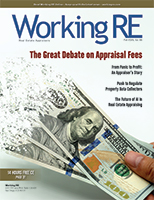 |
> The Appraiser Coach
> OREP E&O |
What’s New at the VA? A Q&A With Its Chief Appraiser
by Isaac Peck, Publisher
Since 1944, the Department of Veterans Affairs (VA) has held a unique role in helping eligible veterans, active service members and family survivors build, buy or refinance a home. It’s financing programs work by guaranteeing that originating lenders will be partially protected from losses if borrowers fail to repay their mortgages. In its history, the VA has backed more than 25 million loans.
The advantage of veteran home loans is that they may offer better terms than traditional financing, with nearly 90 percent of VA-backed loans made without a down payment, according to the VA. In a record-setting 2020, the VA issued guarantees totaling more than $375 billion, which accounted for 12 percent of all single-family home mortgages issued that year, according to the Congressional Budget Office.
In addition to being a favorable avenue to homeownership for eligible veterans, the VA is also known throughout the valuation community for respecting the work of appraisers. As market uncertainty and headwinds persist, Working RE reached out to James Heaslet, chief appraiser at the VA, to get his thoughts on several topics specific to the VA and the profession at large. Heaslet is a retired Marine Corps veteran and a second-generation appraiser who began his valuation career as a trainee at his father’s office in 2007.
In the following Q&A, we asked Heaslet for an update on some of VA’s programs and initiatives, including the Assisted Appraisal Processing Program (AAPP), as well as steps the VA has taken to address bias in appraisals and its role on the Interagency Task Force on Property Appraisal and Valuation Equity (PAVE). Here’s what he had to say:
Question: Can you give us an update on the VA’s AAPP program?
Heaslet: The Assisted Appraisal Processing Program was launched Jan. 1, 2020, to lead the industry in developing an appraisal program that enables VA to better serve veterans in rural areas, reduce appraisal processing turn times and encourage individuals to join the appraisal profession. Under AAPP, the appraisal report, which is required for a VA home loan, may be completed based solely on information gathered by a person contracted with the VA fee panel appraiser. The AAPP has been instrumental in providing flexibility to reach rural areas with limited numbers of local appraisers. New appraisers are trained through AAPP which benefits all homebuyers and homeowners in rural areas. Because VA believes this program adds much value to its home loan program, VA extended the policy on Jan. 1, 2024, to sustain the benefit, especially to rural areas with fewer onsite appraisers.
The data shows that the AAPP did have a positive impact on the appraisal process, with Notices of Values (NOVs) raising in three subsequent calendar years. According to VA records, in calendar year 2020, 11,455 NOVs were issued. In 2022, 19,321 were issued. In 2023, 14,249 NOVs were issued, with a reduction most likely following the market trend. As far as average appraisal turnaround time, in Q2 FY2024, it was 6.8 days nationwide, down from 9.2 days in FY2022.
For more information about AAPP, including guidance and requirements, see VA Circular 26-19-31.
Question: What steps is the VA taking to address discrimination and bias in appraisals?
Heaslet: VA is part of the PAVE Task Force, which President Biden announced on June 1, 2021, as part of the White House initiative to advance racial equity and support for underserved communities through the Federal Government. It’s composed of 13 federal agencies and co-led by the U.S. Department of Housing and Urban Development and the White House Domestic Policy Council. VA implemented guidance from the Task Force to “strengthen its efforts in eliminating discriminatory practices in the appraisal process.”
Actions being taken by VA include adding oversight procedures to detect potential discriminatory bias in appraisal reports, and encouraging training in appraisal bias, fair housing and fair lending for all VA Fee Panel appraisers and lender-approved staff appraisal reviewers. VA also maintains a toll-free number for SARs [staff appraisal reviewers] to use if potential discriminatory bias is identified.
For more information, see VA Circular 26-23-05.
(story continues below)
(story continues)
Question: What role does the VA play on the PAVE Task Force?
Heaslet: As a federal housing agency and a member of the PAVE Task Force, VA wholly embraces efforts to promote transparency, foster collaboration and support the enforcement of fair housing laws, and is committed to government-wide efforts to identify, investigate and eliminate all instances and forms of discriminatory bias.
Two processes that are unique to the VA Home Loan program are the Tidewater Initiative and Reconsideration of Value, both which allow appraisers to request additional sale information prior to the appraisal being completed to assist when relevant sales are not typically available. Furthermore, these two processes challenge low VA appraisals, ensuring that veterans get the most out of their home loan benefit.
Question: What updates or changes has VA made with respect to the items listed in HR 7735?
Heaslet: The Improving Access to the VA Home Loan Benefit Act of 2022 became law on December 27, 2022. The act requires VA to “update regulations, requirements and guidance related to appraisals for housing loans guaranteed by the VA.” VA submitted a report to Congress with recommendations for improving appraisal timeliness. VA is currently reviewing the process to identify ways to further streamline the appraisal recruitment. An update was made to the va.gov website to provide a list of counties where appraisers are in high demand.
VA is also in the process of updating the Assisted Appraisal Processing Program rulemaking to remove the provision currently allowing lenders to “opt-out” of this program, as it is beneficial for the entire industry to promote the training of new appraisers. As far as Minimum Property Requirements (MPRs), a review is currently being conducted of all comments received from an Advance Notice of Proposed Rulemaking on VA’s MPRs that closed on Feb. 9, 2024.
Question: Has VA considered a uniform measuring standard, such as ANSI (American National Standards Institute)?
Heaslet: The simple answer is “no.” However, appraisers follow established industry practices, and these are monitored by the state agencies that license appraisers.
Question: What improvements is the VA planning to its appraisal process?
Heaslet: Key enhancements to the appraisal system will include improved appraisal tracking features.
Question: What changes to MPRs is the VA considering? When might we expect a decision on those?
Heaslet: VA issued an Advance Notice of Proposed Rulemaking seeking public input on potential changes to the Minimum Property Requirements on Dec. 11, 2023. VA collected comments through Feb. 9, 2024. We’re currently reviewing and cataloging the comments to determine next steps.
Question: In what states and localities is the VA looking for more appraisers?
Heaslet: There are several counties across the nation that have been identified as “High Demand Counties” due to a shortage of available appraisers. To help bring more appraisers to the areas that need it, a link to a downloadable PDF of the counties can be found here. VA encourages all who are eligible to apply.
Question: Anything else to add on VA home loans and appraisals?
Heaslet: It’s important to VA that our appraisers have all the resources, tools and information available to support them in doing an exceptional job for our veterans.
Some appraisers have the misconception that because they are on the VA approved panel, VA will protect them if legal action is initiated against them by a borrower or lender in relation to the appraisal process. While the appraisers are eligible to receive appraisal requests from VA and provide property appraisals for VA to guarantee mortgages, individual appraisers are responsible for claims made against them. So, while VA does not require its appraisers to carry errors and omissions insurance, and it may never be needed, it may be worthwhile to consider.
To learn more about the VA loan program, visit their website here.
About the Author
Isaac Peck is the Publisher of Working RE magazine and the President of OREP Insurance, a leading provider of Appraiser E&O insurance that includes additional Discrimination Claim Coverage for appraisers (many programs exclude this important coverage). OREP serves over 10,000 appraisers with comprehensive E&O coverage, competitive rates, and 14 hours of free CE for OREP Members (CE not approved in IL, MN, GA). Visit www.OREP.org to learn more. Reach Isaac at isaac@orep.org or (888) 347-5273. CA License #4116465.
OREP Insurance Services, LLC. Calif. License #0K99465




by Rose Johnson
Mr. Heaslet’s generic overview never even attempts to touch a grave topic of concern– appraisal fraud through VA lender SARs and with ZERO VA oversight.
Lenders who obtain VA approval use may use it as a weapon against veterans, with ineligible properties and improper and/or inappropriate comparables to achieve a profit for lenders and harming veteran buyers relying on VA SAR integrity.
Where is the accountability to the veteran in financial profit being the focus goal of lenders when a veteran discovers he or she is the victim of appraisal lender fraud in a contract? The veteran is then found left holding an empty equity bag and an illegally attached mortgage.
Veterans and the VA must have an avenue to address money-laundering and lender fraud schemes. Where is VA accountability to the veteran sold ineligible property via lender VA SARs using and not addressing inadequate, inaccurate and incomplete appraisals, where the SAR fails, neglects or refuses to follow-up on redflag issues?
Property ineligible is neither legally financeable nor equitable; and except for lender SAR to willingly engage in fraud and ignore safeguards, the property would never move beyond an appraisal with red-flags. When lender profit is the only goal, the veteran is then saddled with a valueless property. When a legitimate appraiser comes into the picture (perhaps in a refinance or a HELOC inquiry), this discovery made has little to no avenue to remove the illegally attached mortgage from the veteran’s (often disabled) back.
Mr. Isaac Peck is asked to respond.
-by D. Phillips
I thank Mr. Heaslet for his USMC service. I do question his role as a “Chief Appraiser” when he states that the VA has “processes [that] challenge LOW VA appraisals” (Low capitalized for emphasis). An appraised value is an opinion and is neither High or Low! No appraiser, especially in a leadership role, should ever make such a statement or even hold such a belief. I also realize Mr. Heaslet is now (and again) a government employee, but to also not push back on the appraisal bias trope when all scientifically appropriate studies have shown that, nationwide, there is no clear pattern, is disheartening.
-